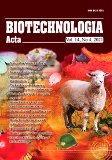ISSN 2410-7751 (Print)
ISSN 2410-776X (Online)

Biotechnologia Acta V. 14, No 4, 2021
Р. 80-87, Bibliography 10, English
Universal Decimal Classification: 628.331
https://doi.org/10.15407.biotech14.04.080
PROBLEMS OF SOAPSTOCK TREATMENT OF VEGETABLE OIL PRODUCTIONS AND THEIR SOLUTIONS
L. Sabliy1, V. Zhukova1, S. Konontse2, O. Obodovych3, V. Sydorenko3
1National Technical University of Ukraine “Igor Sikorsky Kyiv Polytechnic Institute”
2National University of Water and Environmental Engineering, Rivne, Ukraine
3Institute of Engineering Thermophysics of the National Academy of Sciences of Ukraine, Kyiv
Wastewater generated during vegetable oil production contains various pollutants that enter it during soapstock processing: fats and fatty acids and their salts (aqueous soap solutions), glycerin, phosphoglycerates, neutral fat, phosphatides, proteins, carbohydrates, dyes, unsaponifiable and waxy substances, salts, mechanical impurities, etc.
Aim. The purpose of the work was to study the processes of purification of industrial wastewater from oil production and to propose an effective technology for their treatment, taking into account the regulatory requirements for the discharge of treated wastewater into the city sewage system.
Methods. Chemical oxygen demand (COD) was determined by the dichromate method. The concentration of suspended solids was determined by gravimetric method.
Results. As a result of research, calcium carbonate was chosen as an alkaline reagent. After treatment of soapstock with calcium carbonate followed by flotation, the effect of removing the suspended particles was 70–75%, and COD decreased by 60%. On the basis of the research, a technology for processing soapstock was proposed, including sequential processes of physicochemical wastewater treatment —averaging, alkalization with calcium carbonate, stage I of flotation, coagulation, stage II of flotation, oxidation with hydrogen peroxide, filtration through quartz filters and adsorption on carbon filters.
Conclusion. An effective technology for preliminary cleaning of the soapstocks oil production has been developed. This will significantly reduce the concentration of organic matter and other pollutants in soapstocks, which will significantly reduce the impact of such effluents on the processes of biological wastewater treatment of urban wastewater treatment plants.
Key words: soapstock, vegetable oil, pollutants, technology, treatment, wastewater.
© Palladin Institute of Biochemistry of National Academy of Sciences of Ukraine, 2021
References
1. Abdel-Gawad S., Abdel-Shafy M. Pollution control of industrial wastewater from soap and oil industries: a case study. Water science and technology: a journal of the International Association on Water Pollution Research. 2002, V. 46, P. 77–82. https://doi.org/10.2166/wst.2002.0556
2. Liu J., Lien C. Pretreatment of bakery wastewater by coagulation-flocculation and dissolved air flotation. Water science and technology: a journal of the International Association on Water Pollution Research. 2011, V. 43, P. 131–137. https://doi.org/10.2166/wst.2001.0482
3. Chatoui M., Lahsaini S., Souabi S., Bahlaoui M., Amane J. Removal of Wastewater Soaps by Coagulation Flocculation Process. J. Colloid Sci. Biotechnol. 2016, V. 5, P. 212–217. https://doi.org/10.1166/jcsb.2016.1148
4. Drillia P., Kornaros M., Lyberatos G. Wastewater treatment from a motor-oil reforming company using a sequencing batch reactor (SBR). Water Sci. Technol. 2003, 47 (10), 25–32. https://doi.org/10.2166/wst.2003.0529
5. Antonic B., Dordevi? D., Jancikova S., Tremlov? B., Kushkevych I. Physicochemical Characterization of Home-Made Soap from Waste-Used Frying Oils. Processes. 2020, V. 8, P. 1219. https://doi.org/10.3390/pr8101219
6. Tekade P. V., Mohabansi N. P., Patil V. B. Study of physic-chemical properties of effluent from soap and detergent industry in Wardha. Rasayan J. 2011, 2 (4), 461–465.
7. Martins Rui C., Quinta-Ferreira Rosa M. Comparison of Advanced Oxidation Processes (AOPs) based on O3 and H2O2 for the remediation of real wastewaters. J. Advanced Oxidation Technol. 2011, V. 14, P. 282–291. https://doi.org/10.1515/jaots-2011-0214
8. Kiuri H. Development of Dissolved Air Flotation Technology from the First Generation to the Newest (Third) one (DAF in Turbulent Flow Conditions). Water science and technology: a journal of the International Association on Water Pollution Research. 2001, 43 (8), 1–7. https://doi.org/10.2166/wst.2001.0450
9. Saththasivam J., Loganathan K., Sarp S. An overview of oil–water separation using gas flotation systems. Chemosphere. 2016, V. 144, P. 671–680. https://doi.org/10.1016/j.chemosphere.2015.08.087
10. Kweinor Tetteh E., Rathilal S. Effects of a polymeric organic coagulant for industrial mineral oil wastewater treatment using response surface methodology (RSM). Water SA. 2018, 44 (2), 155–161. https://doi.org/10.4314/wsa.v44i2.02

